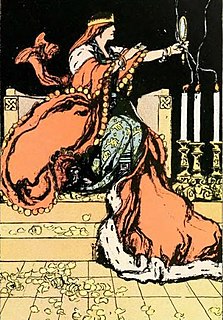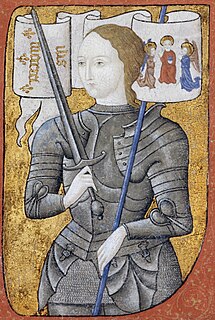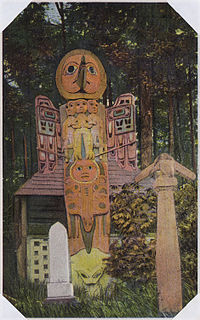 W
WThe Evil Queen, also called the Wicked Queen, is a fictional character and the main antagonist of "Snow White", a German fairy tale recorded by the Brothers Grimm; similar stories are also known to exist in other countries. Other versions of the Queen appear in "Snow White" derivative works, and the character has also become an archetype for unrelated works of fiction.
 W
WA hero is a real person or a main fictional character who, in the face of danger, combats adversity through feats of ingenuity, courage or strength. Like other formerly solely gender-specific terms, hero is often used to refer to any gender, though heroine only refers to female. The original hero type of classical epics did such things for the sake of glory and honor. On the other hand, are post-classical and modern heroes, who perform great deeds or selfless acts for the common good instead of the classical goal of wealth, pride, and fame. The antonym of a hero is a villain. Other terms associated with the concept of a hero, may include "good guy" or "white hat".
 W
WJungian archetypes are defined as universal, archaic symbols and images that derive from the collective unconscious, as proposed by Carl Jung. They are the psychic counterpart of instinct. It is described as a kind of innate unspecific knowledge, derived from the sum total of human history, which prefigures and directs conscious behavior.
 W
WLa belle juive is a recurrent motif with archetypal significance in art and literature, most prevalent in 19th-century Romantic European literature. The belle juive is commonly portrayed as a lone, young and beautiful Jewish woman in a predominantly Christian world.
 W
WLucifer and Prometheus is a work of psychological literary criticism written by R.J. Zwi Werblowsky and published in 1952. In it, Werblowsky argues that the Satan of John Milton's Paradise Lost became a disproportionately appealing character because of attributes he shares with the Greek Titan Prometheus. It has been called "most illuminating" for its historical and typological perspective on Milton's Satan as embodying both positive and negative values. The book has also been significant in pointing out the essential ambiguity of Prometheus and his dual Christ-like/Satanic nature as developed in the Christian tradition.
 W
WMonkey mind or mind monkey, from Chinese xinyuan and Sino-Japanese shin'en 心猿 [lit. "heart-/mind-monkey"], is a Buddhist term meaning "unsettled; restless; capricious; whimsical; fanciful; inconstant; confused; indecisive; uncontrollable". In addition to Buddhist writings, including Chan or Zen, Consciousness-only, Pure Land, and Shingon, this "mind-monkey" psychological metaphor was adopted in Taoism, Neo-Confucianism, poetry, drama, and literature. "Monkey-mind" occurs in two reversible four-character idioms with yima or iba 意馬 [lit. "thought-/will-horse"], most frequently used in Chinese xinyuanyima 心猿意馬 and Japanese ibashin'en 意馬心猿. The "Monkey King" Sun Wukong in the Journey to the West personifies the monkey mind. Note that much of the following summarizes Carr (1993).
 W
WRaven Tales are the traditional human and animal creation stories of the indigenous peoples of the Pacific Northwest Coast. They are also found among Athabaskan-speaking peoples and others. Raven stories exist in nearly all of the First Nations throughout the region but are most prominent in the tales of the Tlingit and Tahltan people.
 W
WIn mythology and the study of folklore and religion, a trickster is a character in a story who exhibits a great degree of intellect or secret knowledge and uses it to play tricks or otherwise disobey normal rules and defy conventional behavior.
 W
WA villain is a fictional character, whether based on a historical narrative or one of literary fiction. Random House Unabridged Dictionary defines such a character as "a cruelly malicious person who is involved in or devoted to wickedness or crime; scoundrel; or a character in a play, novel, or the like, who constitutes an important evil agency in the plot". Its structural purpose is to serve as the opposition of the hero character and their motives or evil actions drive a plot along. In contrast to the hero, who is defined by their feats of ingenuity and bravery and their pursuit of justice and the greater good, a villain is often defined by their acts of selfishness, stupidity, evilness, craziness, cruelty, cunning and displays immoral behavior that can oppose or pervert justice. The antonym of a villain is a hero.